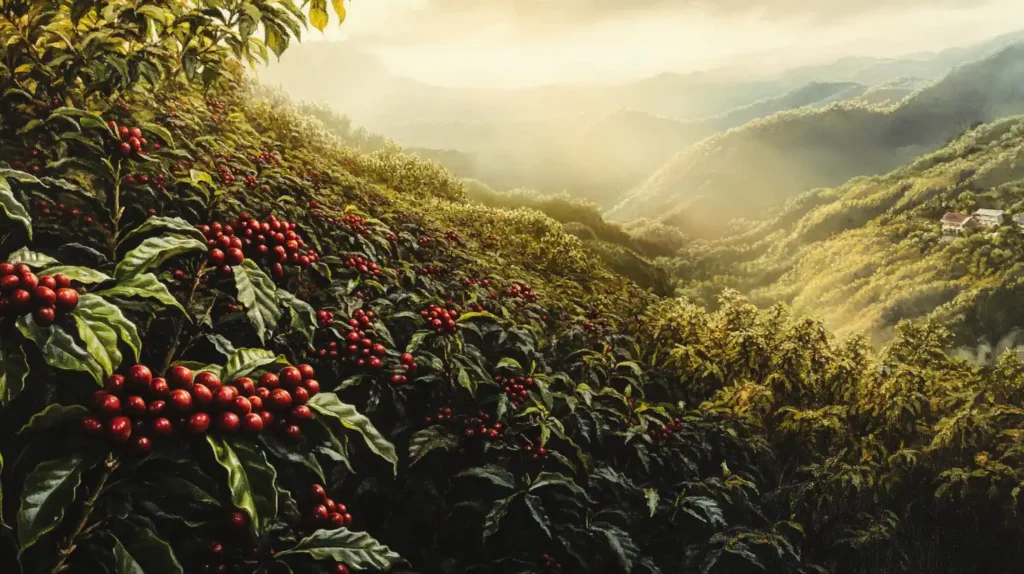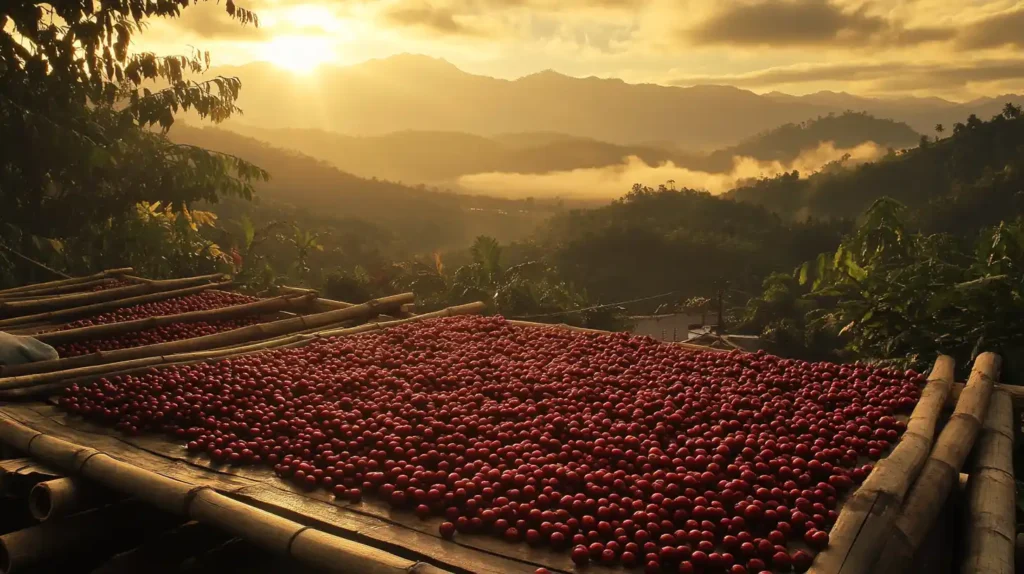I’ve often wondered if the legendary status of Jamaican Mountain Blue Coffee is truly justified by its quality, or if it’s simply brilliant marketing at work.
After investigating this rare coffee’s journey from seed to cup, I can tell you there’s far more to the story than clever advertising.
From its unique microclimate in the misty Blue Mountains to its meticulous processing requirements, every aspect of this coffee’s production sets it apart from ordinary beans.
Let me share what makes this coffee command premium prices and why connoisseurs worldwide consider it one of the most sought-after varieties in existence.
Quick Summary
- Grown exclusively in Jamaica’s Blue Mountains above 3,000 feet, where perfect climate conditions create an ideal environment for coffee cultivation.
- Hand-harvesting and meticulous three-time sorting process ensures only the highest quality beans make it to market.
- Distinctive smooth flavor profile features balanced chocolate and nut notes without bitterness, resulting from precise growing and processing methods.
- Extremely limited annual production of only 450,000 kg makes it one of the world’s rarest and most sought-after coffees.
- Strict quality control standards and official certification ensure authentic Blue Mountain coffee meets premium grade requirements.

Growing Region and Climate
Jamaican Mountain Blue Coffee exclusively grows in Jamaica’s Blue Mountains, specifically within elevations between 3,000 and 5,500 feet.
Let me tell you why that’s a big deal.
These mountains create the perfect storm of growing conditions that you just can’t replicate anywhere else. Have faith in me, people have tried. The region’s sustainable farming methods help preserve the unique ecosystem while producing exceptional coffee.
What makes it so special? I’ll break it down:
- Cool mountain air that slows bean development
- Crazy amounts of rainfall (like, over 200 inches per year!)
- Rich volcanic soil that’s basically plant superfood
- Natural cloud cover that acts like nature’s sunscreen
I’ve got to say, Mother Nature really outdid herself with this setup.
The temperature stays between 45-75°F year-round – perfect for these picky little beans. The mountains trap moisture-laden Caribbean winds, creating this wild mix of rain and mist that the coffee plants absolutely love.
It’s literally impossible to grow this stuff anywhere else. Take my word for it, farmers worldwide would kill for these conditions.
But they’re stuck with second-best because Jamaica’s Blue Mountains are one of a kind. These ideal growing conditions help maintain peak flavor period for an extended time after harvesting.
Harvesting and Processing Methods
These ideal growing conditions lead directly to one of the most meticulous harvesting processes in the coffee world. Those Blue Mountain coffee cherries aren’t just casually picked whenever someone feels like it. No way. They’re hand-selected at precisely the right moment of ripeness. Nothing else will do.
This is why the process makes this coffee so darn special:
- Only the perfectly ripe red cherries get picked
- Each tree gets visited multiple times during harvest
- Every single bean gets inspected. Seriously. Every. Single. One.
The processing is just as obsessive. They use the wet method, which I think is absolutely vital for bringing out those clean, bright flavors. After picking, they’re sorting these babies three times! Green coffee gets graded with ridiculous precision – anything less than perfect gets rejected.
Here’s what blows my mind: while other coffee regions use machines to speed things up, Jamaica’s Blue Mountain farmers stick to traditional methods.
It’s slower. It’s more expensive. But boy, does it make a difference in the cup. The farmers maintain detailed roasting notebooks to track every batch’s unique characteristics.
This washed processing method produces brighter flavors with less fermentation notes compared to naturally processed beans.
Taste Profile
A pristine flavor profile sets Blue Mountain coffee apart from ordinary beans, delivering a remarkably clean and balanced taste that I consider the hallmark of this premium coffee. Let me tell you – it’s nothing like that cheap stuff you’re probably drinking right now.
Consistent grind sizes are crucial for bringing out the full flavor potential of these premium beans.
You’ll notice when you sip it:
- A super smooth, clean taste without any bitter aftertaste
- Gentle, sweet notes of chocolate and nuts
- Zero harsh or acidic flavors (seriously, none)
- A subtle floral aroma that’ll make you feel fancy
I’ve got to be honest – the mouthfeel is incredibly silky. It’s medium-bodied, not too heavy or light. Perfect balance. And there’s this interesting hint of herbs that comes through at the end.
Look, I know some coffee snobs claim they can taste “hints of unicorn tears” in their brew, but Blue Mountain’s profile is legitimately distinctive. It’s got this natural sweetness that doesn’t need sugar – have faith in this one.
The finish? Crisp and clean. No lingering bitterness. Just pure coffee satisfaction that’ll make your regular morning joe seem like dishwater.
Using a burr coffee grinder just before brewing will help you experience the full range of these delicate flavors.
Quality Control Standards
To achieve that exceptional taste profile consistently, strict quality control measures safeguard every Blue Mountain coffee bean from seed to cup.These standards are no joke. The Jamaican Coffee Industry Board isn’t messing around. They inspect every single batch, and I mean every single one.
They’re obsessing over:
- Altitude verification (only beans grown above 3,000 feet make the cut)
- Zero defects policy (those ugly beans? Gone.)
- Moisture content testing (too wet or too dry? Rejected!)
- Size grading (inconsistent sizes? See ya!)
I’ve seen these inspectors at work, and they’re absolutely ruthless. Each bean gets scrutinized like it’s going through airport security.
Seriously.
And don’t even get me started on the cupping sessions – they’re practically religious ceremonies. Light roast profiles help showcase the unique origin characteristics of these premium beans.
The best part? Every bag needs that official Blue Mountain seal. No seal? It’s not the real deal.
I’ve seen fakes trying to pass as authentic. But there’s no fooling these quality control hawks. They’re protecting their coffee’s reputation like it’s Fort Knox.
The beans undergo careful Maillard reaction monitoring during roasting to ensure the development of complex flavors and optimal taste profiles.

Global Market Demand
Despite limited production volumes, Jamaican Blue Mountain coffee commands an insatiable global appetite.
I’ve watched demand surge year after year, especially in Japan, where they snatch up a whopping 80% of the total production. Can you believe that? The Japanese just can’t get enough of this stuff.
These are the market dynamics:
- Luxury hotels and high-end restaurants worldwide compete fiercely for their share
- Specialty coffee shops mark it as their crown jewel offering
- Wealthy coffee enthusiasts hoard it like it’s liquid gold
The scarcity only drives people crazier. When something’s this hard to get, everyone wants it more. Have faith in me, I’ve seen bidding wars break out over single bags of these precious beans.
Here’s the kicker – annual production barely hits 450,000 kg. That’s nothing in the coffee world!
Yet somehow, counterfeits flood the market. Pro tip: If you’re seeing “Jamaican Blue Mountain” everywhere, someone’s pulling your leg. Real stuff? It’s rare as a politician telling the truth. To maintain peak quality, many buyers use oxygen remover packs in their storage containers to preserve freshness longer.
The price tag? Astronomical. But people keep paying. They’re obsessed, and I get it. For optimal flavor, these beans should be stored in airtight containers away from light and heat.
Alex is a self confessed coffee addict – but he takes his love of caffeine seriously in a completely responsible way. He loves trying new coffees and testing the latest machines and is not usually fan of one button pod machines. Alex is happiest when he is tinkering with settings and milk temperatures to create the perfect cup. When not obsessing over coffee, Alex is a keen musician and plays weddings and other social events (usually fuelled by… yes, you guessed it… coffee).


